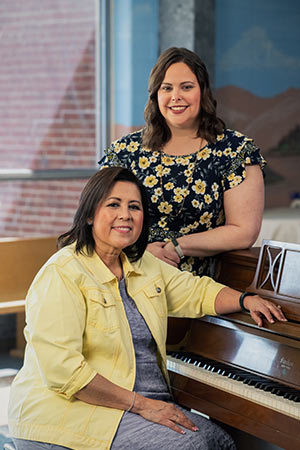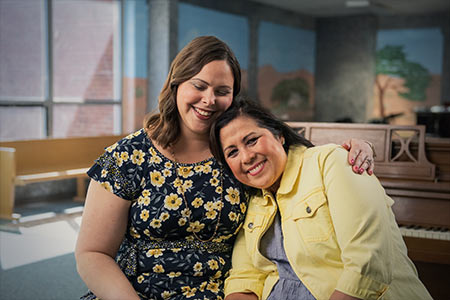I donated my kidney so her song could continue. We are Henry.
 In 2018, Marcy Forsleff, a mom of five and band and choir teacher at Powers Catholic High School in Flint, was diagnosed with chronic kidney disease. Her nephrologist told her that her kidney would likely fail eventually.
In 2018, Marcy Forsleff, a mom of five and band and choir teacher at Powers Catholic High School in Flint, was diagnosed with chronic kidney disease. Her nephrologist told her that her kidney would likely fail eventually.
Then COVID-19 hit, Marcy contracted the virus, and “eventually” arrived much faster. Marcy went into the ER, where her body experienced sepsis—an immune response to an infection that can lead to tissue damage, organ failure and death. In Marcy’s case, it affected her already weakened kidney and threatened her life.
“I was dying and my doctor didn’t think I’d survive the night,” Marcy says. “The nurse told me to stay awake, because they didn’t want to intubate me.”
Marcy made it through the night and left the hospital, but her new normal had changed. She had to use an oxygen tank to breathe, and she couldn’t do many daily activities such as climbing stairs. Marcy also had to leave her music teaching career after 32 years of teaching, and she was afraid she would never get back to her beloved singing.
Her nephrologist started her on dialysis and recommended that she go on the kidney transplant list at Henry Ford Transplant. Marcy went on the registry, and her entire family—including all 13 of her siblings—signed up to be potential kidney donors. Unfortunately, no one was a match.
Enter Courtney Childers, a Spanish teacher at Powers Catholic High School. When Courtney had first started her teaching career, she was in the classroom above Marcy’s and the two women developed a strong friendship.
“At first it was more of a mentorship,” Courtney says. “I was a young teacher, very hardheaded, and she was there to help with life and school stuff.”
When Courtney learned that her friend needed a kidney and couldn’t find a donor, she signed up, took an online survey, then met with a Henry Ford Transplant donor advocate to get initial blood work. She was a match.
“It was a miracle,” Marcy says. “I have such a large family and none of them were a match, but Courtney was. It meant the world to me that she was considering this.”
After matching, Courtney did a full day of assessment at Henry Ford Transplant, including meeting with a social worker, cardiologist, nephrologist, psychologist and others, to discuss what it means to be a donor and the potential risks.
 Courtney decided to go through with it. “When someone needs help, I’ve never said no. I have three kids and I want to set an example for them.”
Courtney decided to go through with it. “When someone needs help, I’ve never said no. I have three kids and I want to set an example for them.”
On the day of the kidney transplant, Courtney’s team used a robotic-assisted procedure to remove the kidney she was donating. Henry Ford is the first and only transplant center in Michigan using robotic-assisted surgical techniques to perform kidney transplants. Because this is a minimally invasive approach, it can be a good option for patients considered too ill to undergo traditional open surgery.
Courtney donated on a Wednesday and was home by Thursday evening to kiss her kids goodnight.
Marcy’s procedure to receive Courtney’s donated kidney was also robotic assisted. She continued to do dialysis three days a week up until the day before her transplant, and her team told her she might still have to do some dialysis after the procedure as her new kidney started working with the rest of her body.
“The first thing I heard coming out of my procedure was that my new kidney started functioning immediately,” Marcy says. “To know that it worked right away gave me a sigh of relief.”
Marcy went home from Henry Ford Hospital after four days, and on the fifth day was already out walking. Since then, she has worked on getting back to life and her singing, and she’s grateful to have a second chance.
“Our surgery was July 28th and I call that my birthday—because it was the day I was able to get back to the normal life I know. Now, every day is a gift.”
.svg?iar=0&hash=F6049510E33E4E6D8196C26CCC0A64A4)

/hfh-logo-main--white.svg?iar=0&hash=ED491CBFADFB7670FAE94559C98D7798)